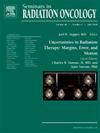Debate 1: Radical Prostatectomy For the Right Patient With High-Risk Prostate Cancer
IF 3.2
3区 医学
Q3 ONCOLOGY
引用次数: 0
Abstract
Prostate cancer is a heterogeneous disease with varying degrees of metastatic potential and responsiveness to treatment. Whether surgical removal or radiation therapy combined with androgen deprivation therapy (ADT) is the best initial course of treatment for those with ‘high risk’ features poses an enduring clinical dilemma. In the absence of an adequate randomized clinical trial to resolve this question, contemporary decision-making seeks to balance expected treatment effectiveness and health-related quality of life over the long time horizon expected by most facing this choice. In this article, we distill the following 5 evidence-based arguments that commonly motivate patients to select radical prostatectomy as initial treatment of ‘high-risk’ prostate cancer. The first is that surgery alone provides excellent long-term cancer control and disease-related survival. Second, radical prostatectomy provides definitive local and regional disease staging, serving as the backbone for multimodality treatment if needed. Third, the sequencing of surgery before radiation is viewed as preferable beca by preserving options for effective local salvage. Fourth, initial surgery successfully defers or avoids the adverse effects of long-term androgen deprivation therapy in a substantial proportion of patients. Lastly, fifth, prostatectomy offers manageable impacts on urinary and sexual function, minimizing risk of gastrointestinal toxicity or secondary malignancy, and averts local symptomatic progression in most.
辩论1:根治性前列腺切除术适合高危前列腺癌患者
前列腺癌是一种异质性疾病,具有不同程度的转移潜力和对治疗的反应。对于那些具有“高风险”特征的患者来说,手术切除或放射治疗联合雄激素剥夺疗法(ADT)是最佳的初始治疗方案,这是一个持久的临床困境。在缺乏足够的随机临床试验来解决这个问题的情况下,当代的决策寻求平衡预期的治疗效果和与健康相关的生活质量,这是大多数面临这一选择的人所期望的。在本文中,我们总结了以下5个基于证据的论点,这些论点通常促使患者选择根治性前列腺切除术作为“高风险”前列腺癌的初始治疗。首先,单靠手术就能很好地长期控制癌症,提高与疾病相关的生存率。其次,根治性前列腺切除术提供了明确的局部和区域疾病分期,在必要时作为多模式治疗的支柱。第三,在放疗前进行手术排序被认为是可取的,因为这样可以保留有效的局部挽救的选择。第四,在相当比例的患者中,初始手术成功地延缓或避免了长期雄激素剥夺治疗的不良反应。最后,第五,前列腺切除术对泌尿和性功能的影响是可控的,将胃肠道毒性或继发性恶性肿瘤的风险降至最低,并避免大多数患者的局部症状进展。
本文章由计算机程序翻译,如有差异,请以英文原文为准。
求助全文
约1分钟内获得全文
求助全文
来源期刊
CiteScore
5.80
自引率
0.00%
发文量
48
审稿时长
>12 weeks
期刊介绍:
Each issue of Seminars in Radiation Oncology is compiled by a guest editor to address a specific topic in the specialty, presenting definitive information on areas of rapid change and development. A significant number of articles report new scientific information. Topics covered include tumor biology, diagnosis, medical and surgical management of the patient, and new technologies.

 求助内容:
求助内容: 应助结果提醒方式:
应助结果提醒方式:


